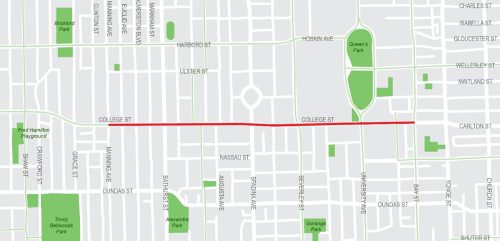The City of Toronto and Toronto Transit Commission (TTC) completed the replacement of streetcar tracks, integrated TTC and cycle streetcar platforms, and pedestrian safety improvements and various locations.
The City has upgraded existing bike lanes to separated cycle tracks. The work included the installation of elevated cycle tracks from Manning Avenue to Spadina Avenue, and at grade from Spadina Avenue to Bay Street.
City Council authorized the College Street Upgrades as part of the Cycling Network Plan: 2022 Cycling Infrastructure Installation – First Quarter on April 7, 2022. A copy of the staff report is available under IEC agenda item IE 28.7.
Project Area
The project area is along College Street from Manning Avenue to Bay Street.

Project Overview
Summary Design Details
Streetcar track replacement
- In September 2022, the contractor replaced the ageing streetcar tracks from Bathurst Street to Bay Street.
- The tracks at the following intersections: Bathurst Street, Spadina Avenue, McCaul Street and Bay Street have not been replaced.
- Removed old concrete/rails, pour new concrete, install new rails, and restore the road.
- Track replacement will ensure reliable service on the busy 506 Carlton streetcar route, which currently transports approximately 26, 000 people per day.
Separated cycle tracks
- Upgraded the existing painted bike lanes on College Street from Manning Avenue to Bay Street to separated cycle tracks to improve safety.
- The cycle tracks have been elevated from Manning Avenue to Spadina Avenue and at grade (with cast in curbs) from Spadina Avenue to Bay Street.
- From Manning Avenue to Spadina Avenue, the cycle track has been installed in the existing parking layby areas, which will result in a modest loss to street parking. 81% of street parking is retained next to the bike lanes outside rush hours.
- The new separated cycle tracks provides the following benefits:
- Reduced risk of dooring and collisions.
- Increased road safety for all road users.
- Make cycling on College Street a more comfortable and social experience.
Integrated TTC and cycle streetcar platforms
- Constructed integrated cycle and streetcar platforms from Manning Avenue to Spadina Avenue.
- The platforms has spaces for people cycling and for people waiting to board a transit vehicle. Transit users wait behind the yellow tactile and only cross the cycle track to board/un-board a transit vehicle.
- People cycling must yield to people boarding/un-boarding the transit vehicles.
- The length of the new platforms is 30 metres. This ensures transit stops meet current standards and are accessible.
- The transit centre island stops at Bathurst Street and at Spadina Avenue intersections has remained unchanged.
Pedestrian safety improvements
Curb extensions
- Extended the curbs at the following locations:
- Lippincott Street
- Manning Avenue (Northeast and northwest corners)
- Euclid Avenue (Southwest corner)
- Augusta Avenue
- Palmerston Avenue (Northeast corner)
- Markham Street (Northeast corner)
- Curb extensions will:
- Reduce crossing distances for people walking and improve sight lines
- Reduce vehicle speeds of turning vehicles
- Provide more public space for pedestrians
- Improve accessibility and user experience for all pedestrians
- Provide additional space for new trees, plantings and/or street furniture like trash cans and bicycle tracks
Raised crossings
- Raised the crossings at the following intersections:
- Brunswick Avenue
- Bellevue Avenue
- Major Street
- Robert Street
- Raised crossings will:
- Create safe crossing conditions at minor intersections
- Help slow traffic and encourage people driving to yield to people walking
- Improve the visibility of people walking
Other improvements
- All intersections from Manning Avenue to Bay Street have been brought up to accessibility standards, which includes the installation of tactile warning indicators.
Public Consultation
Public and stakeholder consultation for the College Street Upgrades was carried out November 1 to November 29, 2021. Consultation activities included web-based stakeholder meetings, a public meeting and following up communications via email and telephone.
Consultation Materials

